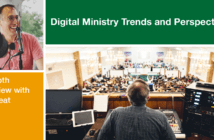Recently I talked with a pastor about how to fund a $6,000 need beyond the resources of the church budget. I felt he had an excellent case for the funds. The ministry sounded important. I asked, “Do you have a layperson or two who are passionate about this need?” He answered, “Yes, I can think of a couple of leaders who understand exactly why we need to do this.” My next reply, “Well, why don’t you ask them to fund it?” He paused and said, “I have just never been able to do that. It may be a weakness in my leadership, but in thirty years I have never asked someone directly for money.”
For religious organizations, when donors are asked to give in person by someone he or she knew, the average donation was 42 percent higher!
This was not an altogether surprising response. Most clergy tell me they have a very difficult time asking people for money. Some do it as a necessity while others never do it. A few actually discover the joy in making an ask. Their churches benefit as they get quite comfortable with sharing a passion for ministry and seeking someone’s partnership in doing it. What everyone needs to know is that it makes a lot of sense to learn to ask.
The Center on Philanthropy at Indiana University just completed a study of more than 8,300 donors that found that donors who were asked to give in person by someone they knew donated 19 percent more to secular charities when compared with a request by other methods such as telephone, email, or letter. For religious organizations, when the donor was asked to give in person by someone he or she knew, the average donation was 42 percent higher!
Despite discomfort, lack of training, and fear of being turned down, remember that on average, if you will personally carry the message and ask, you will get 42 percent more money. That is a good use of time and energy. Of course, all that I am saying applies to laity who can also do personal requests.
If you are a total novice at this, identify a very important need that does not cost too much and for which you lack funding. Think of those who would share a passion for this and also have the ability to fund it. Call and ask for a meeting. Share the need and why it is vital to your church’s ministry. Then ask them if they will consider being the benefactor with a gift of _____. Then be silent! Be prepared to answer pertinent questions and to say when you need the funds. If the person really has a passion and the ability, then you are likely to succeed. The next time will be easier.
Clif is author of Not Your Parents’ Offering Plate: A New Vision for Financial Stewardship, Abingdon, 2008.






